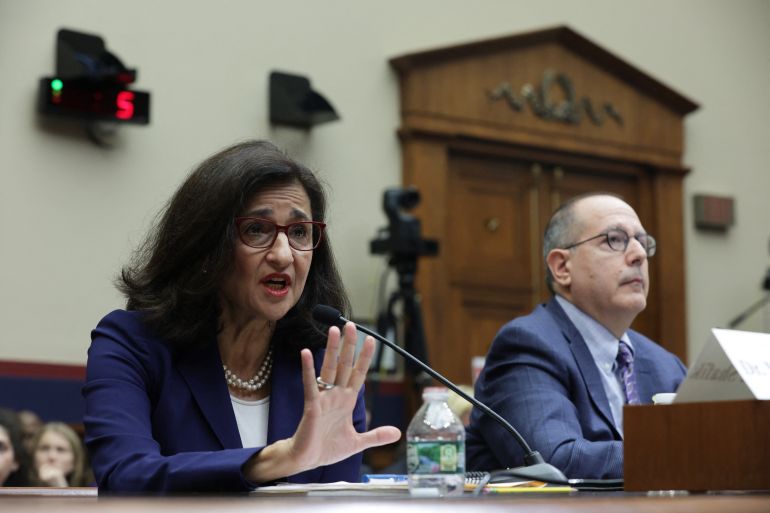Columbia University’s Shafik rebuked over Gaza crackdown but avoids censure
University oversight panel says president undermined academic freedom by allowing New York police to break up Gaza protest.

Columbia University‘s embattled president came under renewed pressure as a campus oversight panel sharply rebuked her administration for clamping down on a pro-Palestinian protest at its New York campus.
President Nemat Minouche Shafik has faced an outcry from many students, faculty and outside observers for summoning New York police to dismantle a tent encampment set up on campus by students protesting against Israel’s war on Gaza.
Keep reading
list of 3 itemsPhotos: Columbia University moves classes online after Gaza protests
Columbia University leaders face scrutiny over anti-Semitism on campus
After a two-hour meeting on Friday, the Columbia University senate approved a resolution that Shafik’s administration had undermined academic freedom and disregarded the privacy and due process rights of students and faculty members by calling in the police and shutting down the peaceful protest.
“The decision … has raised serious concerns about the administration’s respect for shared governance and transparency in the university decision-making process,” the senate said.
The senate, composed mostly of faculty members and other staff plus student representatives, did not name Shafik in its resolution and avoided the harsher language of a censure.
The resolution also established a task force to monitor the “corrective actions” the senate asked the university’s administration to take in dealing with protests.
There was no immediate response to the resolution from Shafik, who is a member of the senate.
She did not attend Friday’s meeting and still retains the support of the university’s trustees, who have the power to hire or fire the president.
Columbia spokesperson Ben Chang said the administration shared the same goal as the senate – to restore calm to the campus – and was committed to “an ongoing dialogue”.
Nationwide protest
Columbia University students who inspired pro-Palestinian demonstrations across the country said on Friday that they had reached an impasse with administrators and intended to continue their encampment until their demands were met.
The development puts more pressure on university officials to find a resolution ahead of planned graduation ceremonies next month – a problem that campuses from California to Massachusetts are facing.
As the death toll mounts in the war in Gaza and the humanitarian crisis worsens, protesters at universities across the country are demanding schools cut financial ties to Israel and divest from companies they say are enabling the conflict.
Police arrested more than 100 people on Columbia’s campus last week and removed the protesters’ tents from the main lawn of the school’s Manhattan campus, but the protesters quickly returned and set up tents again.
The mass arrest at Columbia prompted similar protests and encampments at several other universities in the US.
On Friday at least 40 protesters were arrested in Denver at the Auraria Campus, an institution shared by the University of Colorado Denver, Metropolitan State University of Denver and the Community College of Denver, according to a statement from the school.
In Texas, the president of the University of Texas at Austin, Jay Hartzell, faced a similar backlash from faculty on Friday, two days after he joined with Republican Governor Greg Abbott in calling in police to break up a peaceful pro-Palestinian protest.
Dozens of protesters were taken into custody, but charges were dropped because authorities lacked probable cause – or reasonable grounds – for making the arrests, the Travis County Attorney’s Office said.
Nearly 200 university faculty members signed a letter expressing no confidence in Hartzell because he “needlessly put students, staff and faculty in danger” when police in riot gear and on horseback moved against the protesters.
Meanwhile, hundreds of protesters at George Washington University in Washington, DC, remained gathered for a second day on Friday. The school said students did not follow directions to leave, and several were suspended and temporarily barred from campus.
The White House has defended free speech on campus, but US President Joe Biden denounced what he called “anti-Semitic protests” this week and stressed that campuses must be safe.
Student-led protests against Israel’s war on Gaza have spread overseas.
At the prestigious Sciences Po university in Paris, pro-Israeli protesters challenged pro-Palestinian students occupying a school building on Friday. Police kept the two sides apart.
Pro-Palestinian students at the prestigious university later agreed to call off their action in return for an “internal debate” about the university’s ties to Israel.